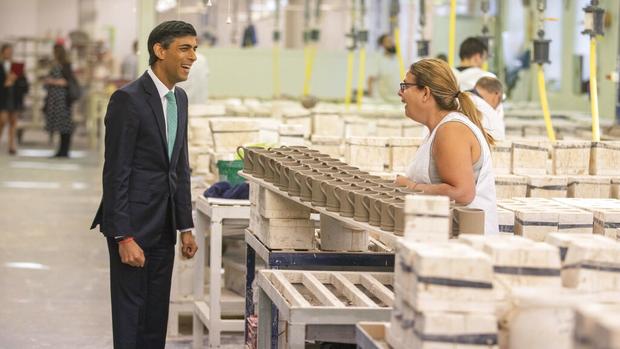 Britain's Chancellor of the Exchequer Rishi Sunak, left, speaks with an employee during a visit to the Emma Bridgewater pottery in Stoke-on-Trent, Staffordshire, England, on Sept 14, 2020. Employees at the factory are now back at work after being furloughed due to the coronavirus outbreak. (ANDREW FOX / POOL PHOTO VIA AP)
Britain's Chancellor of the Exchequer Rishi Sunak, left, speaks with an employee during a visit to the Emma Bridgewater pottery in Stoke-on-Trent, Staffordshire, England, on Sept 14, 2020. Employees at the factory are now back at work after being furloughed due to the coronavirus outbreak. (ANDREW FOX / POOL PHOTO VIA AP)
Britain's Chancellor of the Exchequer Rishi Sunak said now is a time of "challenge and change" for the United Kingdom after unveiling the economic plan he hopes will lead it out of the economic crisis caused by the coronavirus pandemic.
Sunak became chancellor only weeks before the pandemic took off this time last year, and has faced a huge challenge managing an economy encountering conditions unseen in peace time.
Many key points in his budget speech, including the extension of the furlough program from the end of April to the end of September, were released before its official announcement in the House of Commons on Wednesday.
Our COVID support schemes have been a lifeline to millions, protecting jobs and incomes across the UK.
Rishi Sunak, Britain's Chancellor of the Exchequer
Sunak said extending the program, which sees the government pay 80 percent of employees' wages for hours they cannot work, would help millions through "the challenging months ahead", and an expansion of its remit would see an additional 600,000 self-employed people, previously not included, now able to access government help.
"Our COVID support schemes have been a lifeline to millions, protecting jobs and incomes across the UK," he said. "There's now light at the end of the tunnel with a road map for reopening, so it's only right that we continue to help business and individuals through the challenging months ahead and beyond."
ALSO READ: UK firms weigh in against tax increase
A sensible way
The Resolution Foundation think tank, which focuses on people on middle and lower incomes, welcomed this as "a sensible way to wind down an absolutely critical policy. Our estimated cost of this extension is around 10 billion pounds (US$13.96 billion)".
A weekly uplift payment of 20 pounds for people claiming universal credit will continue for another six months, as will the 5 percent reduced rate of VAT for the tourism and hospitality industries. This would take them through what could be an extremely busy summer if lockdown is lifted successfully.
The business rates holiday in England has been extended until June, as has the stamp duty cut, to help the property market.
"Lots and lots more money being spent here on furlough, (universal credit), business support, business rates holiday etc.," tweeted Paul Johnson, from the Institute of Fiscal Studies. "It's not just 2020-21 which will see huge spending and borrowing. Won't be as big in 2021-22 but will still be very big indeed."
In 2023, corporation tax will rise to 25 percent, which Sunak admitted would not be popular, but defended as "honest" and "responsible". He also announced a new small profits rate, which means only businesses with profits above 250,000 pounds will pay the 25 percent rate. "That means only 10 percent of all companies will pay the full higher rate," he added.
Over the past 12 months national debt has reached its highest level since 1963, pushed up by measures such as furlough.
The independent Office for Budget Responsibility estimates that government borrowing could be in excess of 393.5 billion pounds by the end of the financial year, which would be the highest level seen since World War II. Sunak admitted that paying back this debt will be the work of "many governments" over many years.
Investment plans were announced for some areas of the country won by the Conservative Party at the 2019 general election, as was noted by BBC Newsnight policy editor Lewis Goodall, who tweeted: "Clearest sign yet of Conservatives grappling with their new electoral coalition and the political geography created by the 2019 general election."
In response, opposition Labour Party leader Keir Starmer said this was not "a big transformative budget" but simply "papers over the cracks", many of which were caused by the "deep economic damage" caused by years of Conservative policy, leading to an "economy built on insecurity".
READ MORE: BOE dividend decision offers relief to embattled UK banks
Contact the writer at julian@mail.chinadailyuk.com


